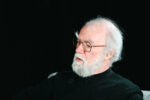A Conversation with Luci Shaw
By Interview Issue 75
Luci Shaw is attentive to balance, cultivating both an active engagement with the arts in culture and the solitude necessary to listen and catch at language. Her twelve acclaimed collections of poetry include What the Light Was Like, Harvesting Fog, and the forthcoming Slow Pleasures. Her nonfiction includes Breath for the Bones: Art, Imagination, and…
Read MoreElective
By Short Story Issue 74
I DON’T CARE how long you’ve been teaching. Nothing prepares you to handle a fastidious sixteenth-century theologian who wants to write romance novels. A great many questions sprang to mind when John Calvin strode into our classroom that first night. What had he been doing with himself for the past five hundred years? Why a…
Read MoreA Conversation with Robert Clark
By Interview Issue 78
Robert Clark was born in Saint Paul, Minnesota. He received a BA in English from the University of California, Berkeley, and an MA in medieval studies from the University of London. He is the author of ten books, both fiction and nonfiction. Clark’s first collection of personal essays, My Grandfather’s House, was a finalist for…
Read MoreMeditations on Writing and Lawyering
By Essay Issue 79
I’M WAITING for the 6:40 am train to take me to Boston. It’s a forty-five minute ride that I use to read “inspirational” works. What’s inspirational? Anything that helps get me through the day with some kind of inner peace, with a sense that what I’m doing is worthwhile. I take a deep breath as…
Read MoreA Conversation with Rowan Williams
By Interview Issue 80
Rowan Douglas Williams was born in Swansea, south Wales, in 1950, into a Welsh-speaking family, and was educated at Dynevor School in Swansea and Christ’s College, Cambridge, where he studied theology. After two years as a lecturer at the College of the Resurrection, near Leeds, he was ordained deacon in Ely Cathedral before returning to…
Read MoreWhat Now?
By Essay Issue 80
The Road Behind Us Image’s Founding Generation When Image was founded in 1989, the cultural landscape looked different than it does today. Religious writers and artists felt cold-shouldered in the public square and often ill at ease within the church. The need for a journal that demonstrated the continuing vitality of contemporary art informed by…
Read MoreFrom Culture War to Culture Care
By Essay Issue 80
The Road Behind Us Image’s Founding Generation When Image was founded in 1989, the cultural landscape looked different than it does today. Religious writers and artists felt cold-shouldered in the public square and often ill at ease within the church. The need for a journal that demonstrated the continuing vitality of contemporary art informed by…
Read MoreWeb Exclusive: A Conversation with Dan Wakefield
By Interview Issue 82
Dan Wakefield recently edited a book of the letters of Kurt Vonnegut, with whom he maintained a literary friendship over four decades. Though Vonnegut is often associated with the skepticism and iconoclasm of the sixties and seventies, faith held a mystique for him. At times he called himself a “Christ-loving atheist” and “a Christ-worshipping agnostic.”…
Read MoreMoravia
By Short Story Issue 82
1. AUNT MORAVIA SAID that she had swallowed a glass piano. She was my father’s aunt, a stitch of an old woman. She’d come to live with us when I was seven and my brother Robbie fifteen. Mother had been bedfast for a month before the birth of my sister. In the meantime Aunt Moravia saw to…
Read MoreSpiritual Fallout
By Poetry Issue 81
Cave of the Apocalypse Whenever it happened, the cavern would illuminate from no source. The air would dry and warm, the hair along my arms slightly rising. There was a living pressure, a vibration in the air, a vibration I couldn’t name or grasp or articulate. The rock ceiling, now cloven into three…
Read More



